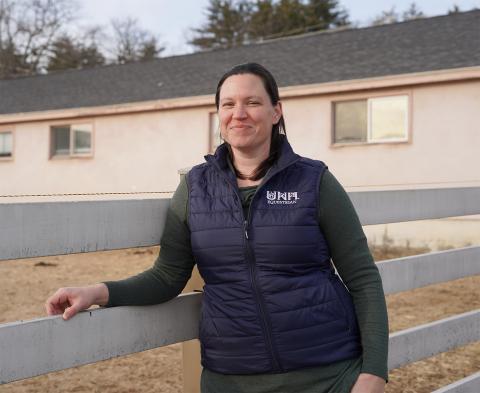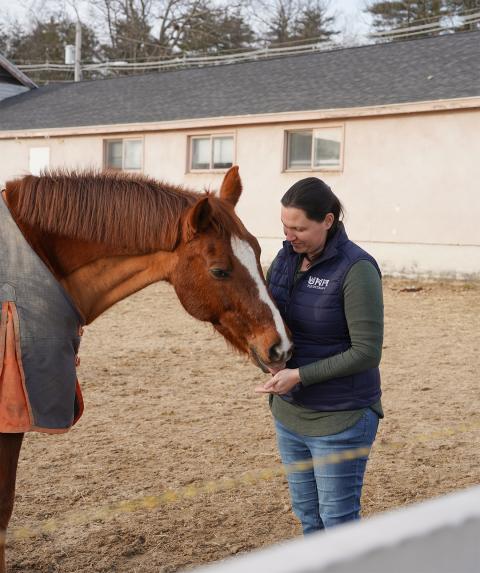
UNH’s Equine Facilities manager Erin Morgan-Paugh comes to the university with 10 years of teaching experience in an equine program, as well as a background in large animal medicine. Originally from Connecticut, she completed her undergraduate and graduate degrees at Cornell University before working in veterinary practice and later joining the State University of New York at Morrisville to help launch, grow and run the university’s equine rehabilitation center and programming.
Joining the farm manager team at the NH Agricultural Experiment Station this past summer, she’s excited to be back in New England and eager to expand opportunities for students to hands-on equine training and care.
“Our main goal at the UNH Equine Center is to provide a good model of proper horse care for students, so when they go out into the industry, they know what standards they should have for animal care and for general practice.”
Position: Manager of the UNH Equine Facilities
Starting date with NHAES: July 2023
Previous positions: Faculty member at State University of New York at Morrisville, private veterinary practitioner

Erin Morgan-Paugh: When I was a child, I rode horses, so I’ve always had an interest in horses for sure. I did not initially go to college to specifically study large animal medicine, but as I began training and working in the field, I grew to enjoy this side of veterinary work.
Where did you work prior to coming to UNH’s equine facility?
Erin: I worked as an equine science faculty member at the State University of New York at Morrisville for 10 years. During that time, I also ran their equine rehabilitation program and equine rehab center, which is essentially horse physical therapy. The center opened about a year before I started, so I helped build and grow it, and redesigned the equine rehabilitation program there.
Injured horses, either outside clients or horses at the school, would come to the center, and we would provide treatments to help them heal more fully and quickly, using methods and tools like swimming and underwater treadmill work, as well as smaller therapies like therapeutic lasers, ultrasounds and electromagnetic field therapy. We’d also have horses coming in to get back into shape after the offseason. Just like with people, swimming is a great exercise for horses, so they’d come in for swimming and conditioning. While providing these treatments, I was teaching these techniques to SUNY students in equine rehabilitation.
You worked at a private practice for a year and a half before moving to SUNY Morrisville. What inspired that career change?
Erin: I’ve always enjoyed teaching. Even in private practice, we frequently mentored veterinary students or high school students who were interested in veterinary medicine, and I always liked that aspect of the job. SUNY Morrisville’s equine rehabilitation program focuses on ligaments and musculoskeletal injuries, which are areas I was interested in in practice, so I was able to combine my medical interests with my love of teaching.
What do you enjoy most about managing and teaching at an equine center? What are you most excited about in your new role at UNH?
Erin: I appreciate the connection between hands-on learning for the students, and I hope to increase opportunities for applied learning in my current role. I would love to incorporate the horses into various courses within the College of Life Sciences and Agriculture’s other programs, such as the veterinary tech program, so that students can work more with actual animals and gain valuable real-world experience.
Our main goal at the UNH equine center is to provide a good model of proper horse care for students, so when they go out into the industry, they know what standards they should have for animal care and for general practice.
What are some unique skills you bring to this role?
Erin: I have training in equine acupuncture, for one. Acupuncture for horses is really useful in optimizing a wide range of biological processes, such as respiration and reproduction, and restoring balance within the body. I have primarily used it for treating musculoskeletal injuries and issues, such as lameness, but there’s all sorts of other applications for horses.